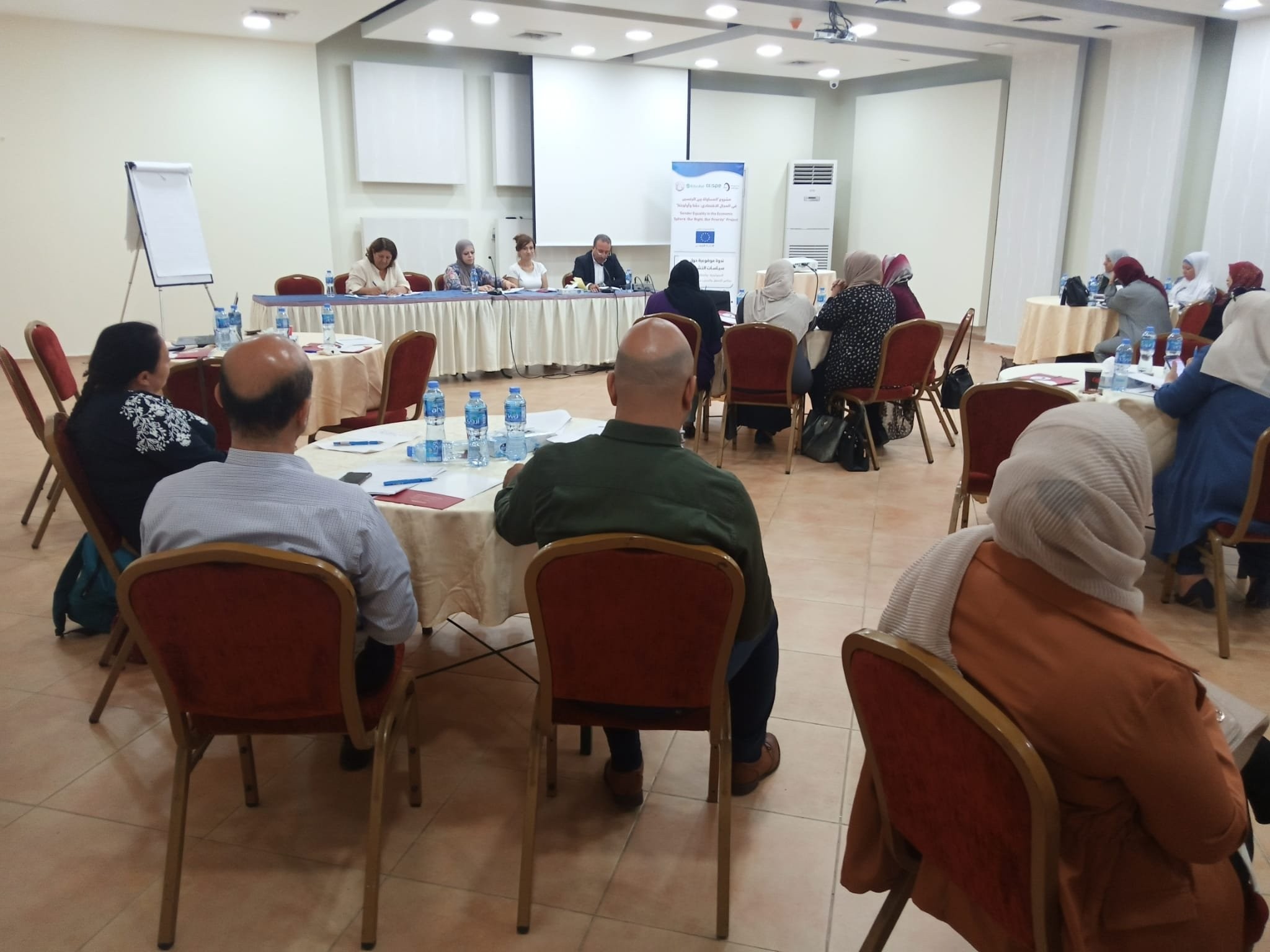Aiming to empower civil society activists to acquire knowledge about the policies, plans and mechanisms they should refer to, and interact with, in order to defend women’s labor and economic rights, and enhancing networking and coordination with official institutions, the Democracy and Workers Rights Center (DWRC), held a seminar about employment policies and decent work on Monday 25/7/2022 in Al-Bireh. The seminar hosted representatives of the Cabinet, the Ministries of Labor, Women Affairs, Palestinian Employment Fund, Ministry of Finance, Ministry of Public Works and Housing, the Ministry of Economy, as well as representatives of NGOs, and women’s grassroots organizations from Hebron and Jericho governorates.
DWRC’s project manager, Ms. Carine Metz, opened the seminar highlighting the importance of the project: “Gender Equality in the Economic Sphere: Our Right, Our Priority”, that is dedicated to enhancing Palestinian Civil Society Organizations (CSOs) engagement in and contribution to advancing gender equality in Palestine, in particular women’s economic rights. She said: “achieving progress in women’s employment, especially women with disabilities, is a major socio-economic and human rights challenge in Palestine considering that the percentage of women labor force participants was 17.2% comparing to 73.2 for men in 2021, and less than 2% for women with disabilities”. Ms. Metz added: “around half of the females graduates with a higher education diploma are unemployed, thus such seminars are important in order to improve the interventions of CSOs as tools to increase women’s participation in the labor market, as well as strengthening economic growth and decent work for all”.
The first session of the seminar addressed employment policies and the ministries’ vision of implementing these policies. The representative of the Ministry of Women Affairs, Ms. Ilham Sami, reported that the ministry seeks to integrate gender and realize gender equality at all the levels and within various sectors using a human rights based approach. She said: “the role of the ministry is to ensure the evaluation of the current situation; based on the findings, tendencies and priorities are determined, informing national and strategic planning, as well as partnerships and networking”. The speaker also mentioned that the major challenges that the ministry faces in providing employment for women include the applied taxes policies and marketing challenges, as well as policies related to specifications and standards, in addition to difficulties in accessing resources and information.
The General Director of Labor Policies at the Ministry of Labor, Mr. Azmi El-Haj, mentioned that the ongoing human rights violations perpetrated by the Israeli occupying power and continued confiscation of natural resources, add new challenges and difficulties for the Palestinian community on the level of employment. He noted: “the Ministry will work in partnership with the related organizations to develop programs and policies within the local labor market and increase monitoring of the enforcement of the minimum wage, alongside working on “Istidama” fund with zero interest to support micro projects”.
The representative of the Palestinian Employment Fund, Inas Qubbaj, mentioned that the Fund works to implement national employment policies. She said: “the Fund provides financing services and temporary job opportunities, alongside training women on developing feasibility studies of their projects and marketing with a focus on marketing analysis”.
Activist Nirmeen Koumi presented a work paper in the second session about the challenges that persons with disabilities face. Koumi said: “Men with disabilities are given preference over women with disabilities by employers. There is also discrimination in employment based on the type and degree of disability” and discrimination against women with disabilities is doubled due to the limited work opportunities available for them. The speaker emphasized the necessity to prioritize the needs of persons with disabilities within the plans of the ministries and civil society organizations, as well as the private sector. Koumi stressed the necessity to develop a national plan to integrate persons with disabilities within the community, and eliminate all the challenges they face in this regard.
During the third session, women participants presented several challenges they face. One of them mentioned that they face difficulties in opening bank accounts for cooperatives and CBOs they establish. The participants added that there are high fees and financial requirements for establishing cooperatives. Another challenge mentioned is that there is no integration of persons with disabilities within the labor sector.
Seminar participants issued a number of recommendations, among which the necessity to provide social protection for persons with disability, as well as empowering CSOs and organizations. Moreover, participants recommended arranging periodical workshops with the ministries to introduce the public to the role of the ministries in empowering and supporting women. Another recommendation was the necessity to develop a complementary plan between ministries and organizations to ensure employment and decent work for all without discrimination.
This seminar is part of the project: “Gender Equality in the Economic Sphere: Our Right, Our Priority”, which is implemented by DWRC in partnership with Italian NGOs, COSPE and EducAid, and the Palestinian Working Woman Society for Development (PWWSD), and is funded by the European Union.




